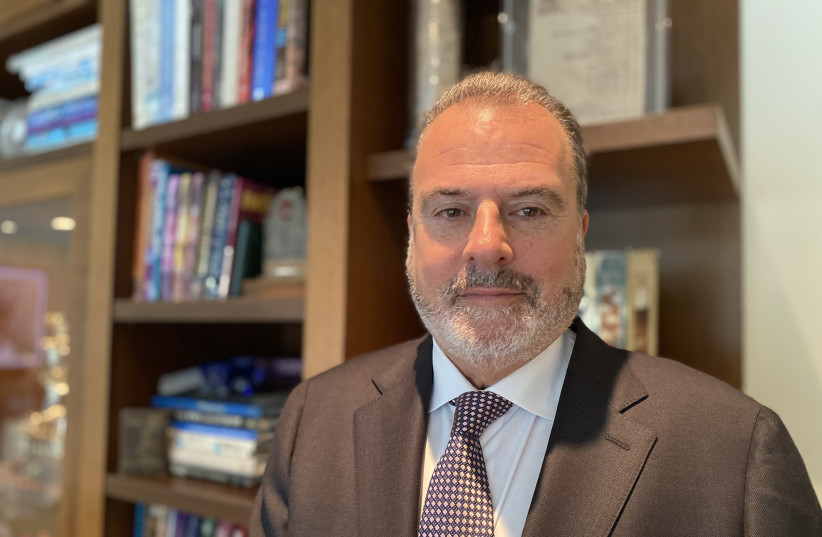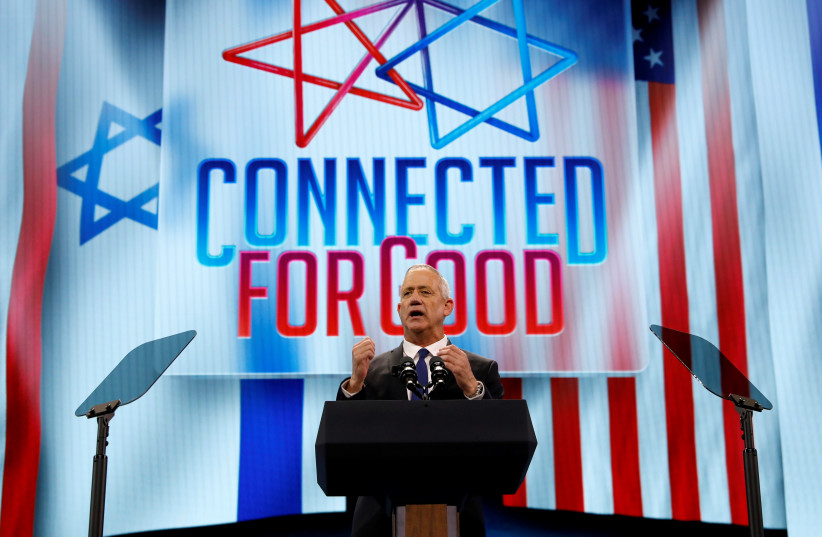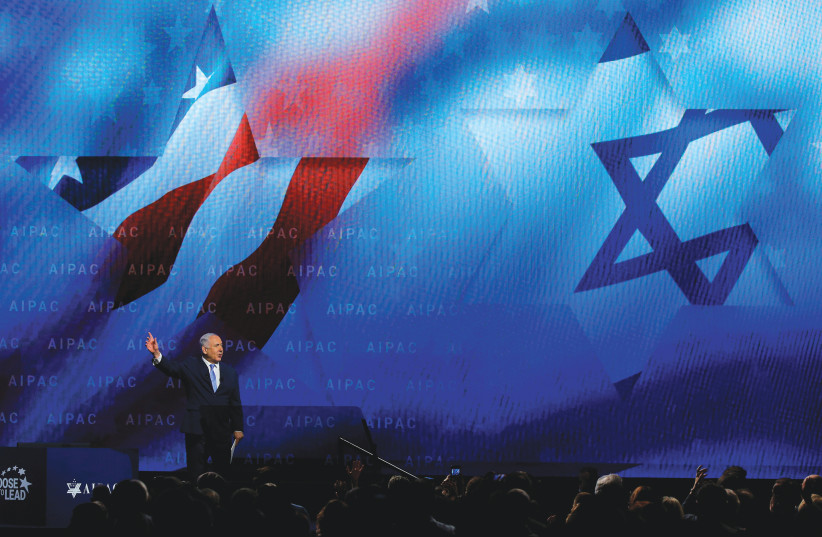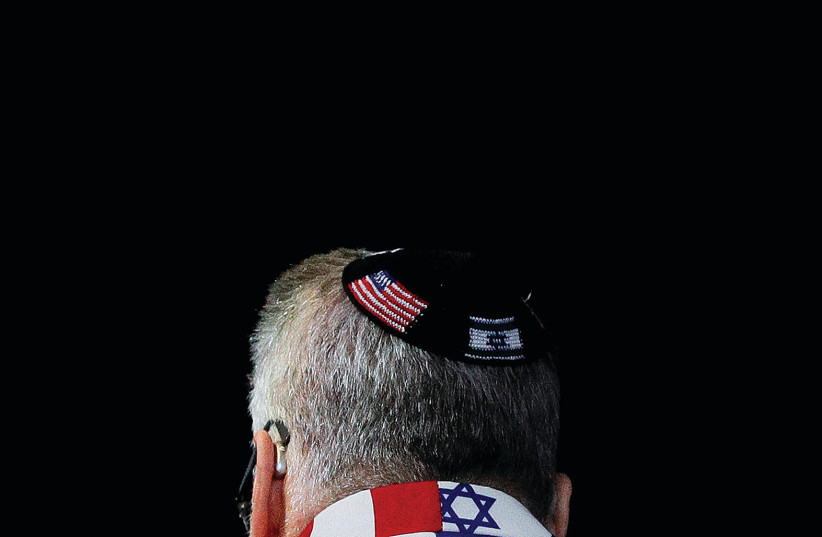“Gulf diplomats to the US and world leaders have been asking me ‘when is the other guy coming back?’” Jewish American philanthropist Robert (Bobby) Rechnitz told The Jerusalem Post on Wednesday from his home in Los Angeles.
Rechnitz, a supporter of the Likud Party and its chairman and opposition leader Benjamin Netanyahu, claimed that since Netanyahu stepped down from his role as prime minister a year and a half ago, Israel and the US have abandoned the Abraham Accords and haven’t been taking the Iranian threat seriously.
“Nobody has done anything,” he said.
Rechnitz, a member of a well-known philanthropic Orthodox family was instrumental in the passage of the US Iron Dome legislation and lobbying the Biden administration against reentering the proposed new Iran deal.
The Los Angeles-based real estate developer is now pushing Abraham Accords countries to rally together against Tehran and move negotiations forward between Israel and the Arab world.

Having shuttled back and forth throughout the region, he is concerned that neither of the current administrations has done enough to widen the family of nations in the accords or push back against Tehran’s race to the bomb. He said he is equally “shocked” at the inaction of major American Jewish organizations on both fronts.
Are all parties in touch with Israeli media?
“There's a strong common denominator, which in the beginning even surprised me because I wasn't involved, obviously, in the negotiation,” he continued. “All the groundwork was done over the last 10 years,” he said of the accords.

Rechnitz hasn’t spoken to the Israeli media for more than a decade. The last interview he gave was to the Post in 2008, when he decided to establish the Jerusalem Conference, an annual parley of the conservative Israeli views, to counter the Herzliya Conference. He explained, “I created the Jerusalem Conference to add balance to what was the power of the Herzliya Conference at the time of former prime minister Ariel Sharon’s announcement of the Disengagement.”
Rechnitz, who said he doesn’t represent any Jewish organization, said that he decided to become more active recently due to his perceived lack of action from Jewish institutions and from the Israeli government in implementing the Abraham Accords.
“I was in a leadership role for different Jewish organizations but I’ve since left them,” he said, without mentioning their names. He added that he “hired a consultant, two or three lobbyists in Washington, DC and one guy in my office,” in order to promote his values and ideals regarding Israel.
In June, a group of representatives from the Middle East, as well as the US, met in the House of Representatives for a round table discussion on the proposed Joint Comprehensive Plan of Action’s repercussions on the Abraham Accords. Rechnitz was the host of the event and served also as moderator.
“It was a very effective meeting,” Rechnitz said of his event, which included ambassadors.
“All the groundwork was [laid] over the last 10 years,” he said of the accords. “It culminated under the Trump administration; we had a good formula of having Donald Trump, [senior adviser] Jared Kushner, [ambassador to Israel] David Friedman, the timing was right. I think all the preparation was done by the Netanyahu government. I’m not shy about that. I’m familiar with all the back channels.”
The leaders told Rechnitz, “We [Israel and the Jewish organizations] have been silent for two years and Iran is going to get the nuclear bomb. The reason we joined together is because we all have a common enemy. I’ve heard this from countries that don’t talk to each other, but they like Israel and they had a tough sell with their citizens, to get people to go along with it.”
He said he understood, after speaking to these leaders, that “the popularity of Israel in these countries has dropped since the signing of the accords.
“Cooperation in the defense-tech field and tourism are great,” said Rechnitz, “but they want to see more. They were hoping to see more. And they’re looking for leadership, and they aren’t seeing any in Israel. There’s a leadership vacuum.”
Rechnitz added that, “The White House announced that they’re going to be reaffirming and strengthening the Abraham Accords, which is a lot of rhetoric. Nobody knows what it means.”
WHEN THE Post insisted that there have been actions made by the current government to strengthen the Abraham Accords, by mutual visits and dialogue between the leadership, Rechnitz answered that in his perspective, it simply isn’t enough.
“If we’re talking about diplomacy, and mutual visits, I think you’re right, I think the courtesy has been there. The good feelings have been there. But as far as meat on the bone, there’s been no further economic deals, there’s been no further economic cooperation – outside the defense industry.
“The most important unifying factor is that the Sunni Arabs are aligned with Israelis: they don’t want the Middle East to be under the threat of Iran’s nuclear power. Iran is moving closer to it every day.
“They would like me to pass the message along; they can’t say anything officially,” he said of the diplomats of Muslim countries who have been in touch with him.
“I was there in the UN, I met with representatives of different countries who I have gotten to know over the years. There’s a commonality among them; it is the Iranian threat. And the person that identified the Iranian threat to all of them and to the world 25 or 30 years ago, is [Benjamin] ‘Bibi’ Netanyahu.

“That’s their concern: ‘Who is leading [Israel]? Who was leading the fight?’ To which I respond: There are democratic elections in Israel. If the public feels that way, then the public will vote.”
Asked if Netanyahu should step down from leadership of the Likud if he isn’t able to form a government in the upcoming elections, Rechnitz said, “My personal view has always been that he [Netanyahu] views himself as the guardian of the Jewish people. Now, that sounds very grand, but I knew his father; I know where he comes from.
“It’s not easy being prime minister. Some people just want to go back to their day job. Here’s a man who’s a historian and an economist, who would be successful at anything that he did. But he doesn’t sleep at night, because he’s worried about the safety of Israel.”

HE SAID that as an American, he won’t interfere in Israeli politics, but as a Jew in the Diaspora, “I hope that the public looks at the big picture in terms of what’s good for Israel in terms of where they fit in, in terms of global security. You can’t keep switching parties and loyalties every day. It doesn’t work,” he alluded to right-wing leaders that have established new parties in recent years.
Asked if he agreed with a statement made by former ambassador to the US Ron Dermer, insinuating that he preferred investing in the relationship with Evangelical Christians and Orthodox Jews instead of the broader American Jewish community, Rechnitz said he’s “not sure” he agrees.
“I agree that during the time that Ron Dermer was in Washington, those were probably the toughest years for an Israeli ambassador to the US,” he said. “Having a very charismatic leader in the White House who put enormous pressure on Israel through Ron Dermer, [Barack Obama], who put enormous pressure on the Israeli prime minister at the time – it was difficult times.
“I’m not sure that I agree that it’s just the Evangelicals and Orthodox Jews today” who support Israel. “It’s a matter of education.”
He added that he thinks the government should create a position of a hasbara (public diplomacy) minister, particularly someone “who wasn’t born in Israel, perhaps from the United States, the UK or from another Western country, who understands marketing. It should be somebody very young and totally inexperienced in politics,” he said with a smile, “because it’s not about politics. It’s about branding and getting your message out there.”
Rechnitz also insinuated that Jewish organizations in the US are not standing up for Israel as he would expect from them.
“I don’t see anyone intensely lobbying the government, the House, the Senate, to completely suspend any discussion on the Iran deal. And the fact that this Lebanon deal just came up now as a side appetizer makes it even worse. That is their job, they’re supposed to be looking out for Israel and for the West’s interest and I don’t see it being done.”
